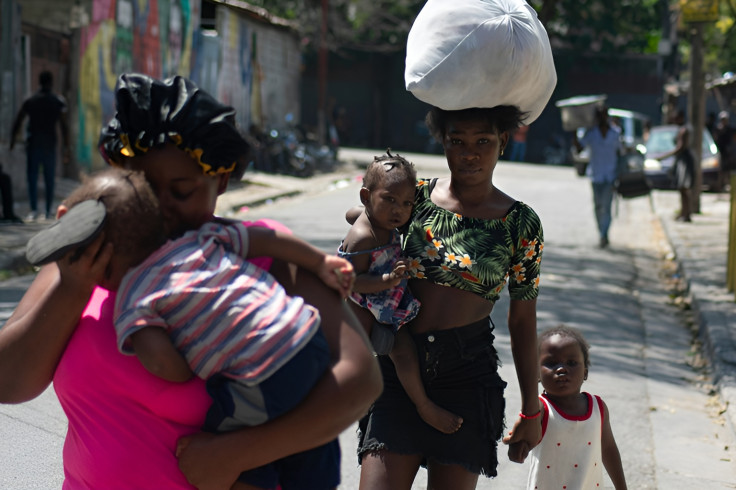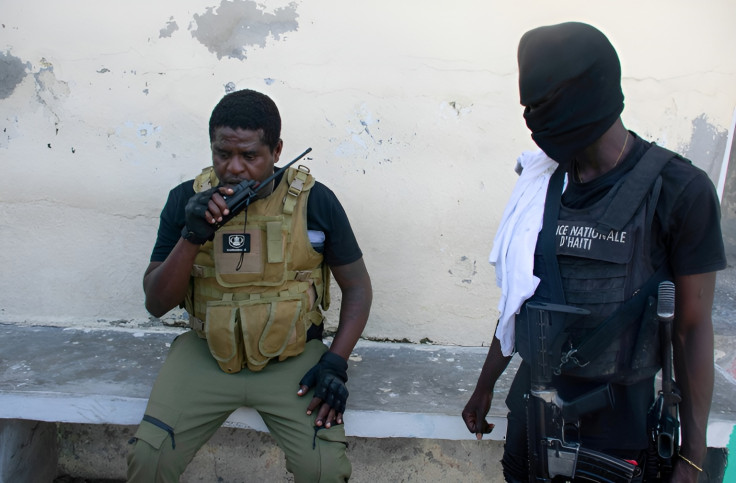
The capital of Haiti, Port-au-Prince, remains engulfed in violence, with armed gangs attempting to topple the country's remaining -and weakened- institutions, prompting the United States and other countries to evacuate all non-essential staff from their embassies.
Caribbean countries are set to hold an emergency meeting in Jamaica on Monday to discuss the country's deteriorating situation. Secretary of State Antony Blinken will be in attendance at the the Caribbean Community (CARICOM) meeting, the State Department announced.
The situation in Haiti is growing more dire by the hour, as clashes between the armed gangs and the police intensify. Hospitals have been reportedly under attack, food shortages are rampant, and there are blockades hindering civilian movement.
The president of El Salvador, Nayib Bukele, has offered to address the ongoing situation, saying "we need a UNSC resolution, the consent of the host country, and all the mission expenses to be covered."
Recently re elected for his credited efforts in dismantling gangs and improving security in the country, Bukele faces praises and criticism alike given the approach's clear results but also reported excesses and disregard for human rights in his practices.
As the world looks on the future of Haiti, the Caribbean's first independent state, here are three crucial aspects to consider when trying to understand the Haitian crisis:
1. What Triggered the situation?

The level of violence in Port-au-Prince has seen a significant rise since February 28, following a commitment from Haitian Prime Minister Ariel Henry to holding elections by the end of August 2025.
This timeframe is considered notably distant, particularly considering that the Prime Minister's term was originally set to end on February 7, as per a 2022 agreement.
The onset of coordinated gang attacks, which managed to breach two prisons and enable a mass escape of around 4.000 inmates, coincided with the day the prime minister arrived in Kenya.
Henry had traveled to negotiate the deployment of a multinational police force to help combat gang violence, which has reached unprecedented levels. The president has yet to return to Haiti and is stranded in Puerto Rico as gangs have surrounded the airport and are preventing him from landing.
2. 80% of the City is Under Gang Control
"With no prime minister and a government in disarray, the gangs' power over the capital is near absolute," an article by the BBC reported on Monday.
As per the outlet, the gangs control more than 80% of Port-au-Prince and the country's most notorious gang leader, Jimmy "Barbecue" Chérizier has been threatening the prime minister to resign.
"If Ariel Henry doesn't step down and the international community continues to support him," he adverted last week, "they will lead us directly to a civil war which will end in genocide."
Meanwhile, the police, outnumbered and demoralized, are struggling to keep looters at bay. The Salomon police station in Port-au-Prince was attacked and burnt out, and charred police vehicles lie outside the still-smoldering building.
3. The Poorest Country in the Americas
Haiti has been enduring severe political, economic, health, and security crises for years. It is not only the poorest country in the Americas, but also one of the least developed in the world. Haiti ranked 163 out of 191 countries on the United Nations Human Development Index for 2022.
In that context, and as it's become the case in other poor nations of Central America, gangs have increasingly gained power, channeling anger and fueling a state of constant violence. Haiti was one of the countries in which violence increased the most last year, with a 126% increase in homicides, according to a report by InSight Crime.
"Violence — in many forms — has been spiraling out of control since the assassination of Haiti's President Jovenel Moïse in 2021. With the state unable to protect its citizens, vigilante groups began extrajudicial killings of alleged gang members," InSight Crime noted.
The investigation into who ordered the assassination is still ongoing, but the power vacuum created by that event still reverberates in the war between the government and the gangs vying for control of the country.
Meanwhile, the population is in a highly vulnerable situation, several organizations have alerted. The NGO Mercy Corps warned of food supply risks in Haiti, as the blockade of the international airport prevents "the little aid that Haiti currently receives" from reaching the country.
Meanwhile, the IOM warned that healthcare is severely affected, with "hospitals attacked by gangs and forced to evacuate medical staff and patients, including newborns." "Close to three thousand pregnant women are at risk of not being able to access essential healthcare," several UN representatives warned last week.
© 2024 Latin Times. All rights reserved. Do not reproduce without permission.







